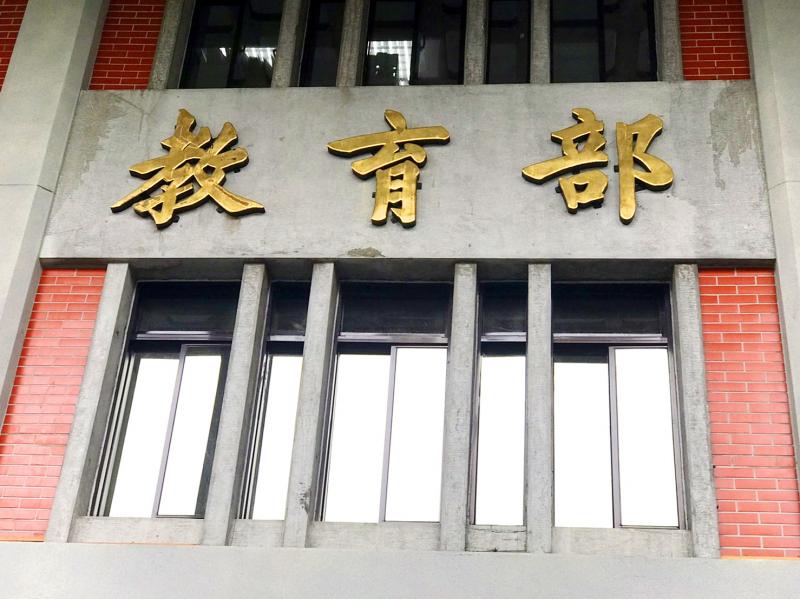In light of the nation’s low birthrate, the Ministry of Education is encouraging public and private universities to launch “special international programs” to attract overseas Taiwanese and foreign students who might not be fluent in Mandarin.
The policy, set to begin in August, aims to enroll 1,000 students specializing in manufacturing, construction, agriculture and long-term care, the ministry said, adding that the government hopes to triple the number of overseas Taiwanese and foreign students from 14,000 at present to 42,000 in 2030.
Only students with A2-level Mandarin are currently allowed to study in Taiwan, with the only exception being the New Southbound International Programs of Industry-Academia Collaboration, which do not require students to be fluent in Mandarin.

Photo: Rachel Lin, Taipei Times
Students who enroll in the “special international programs” should know basic Mandarin and English before coming to Taiwan, the ministry said.
After they learn Mandarin for one year and reach A2 level, they can major in four areas — manufacturing, construction, agriculture and long-term care — or take specialty classes that fall under the program, the ministry said.
However, they are required to pass B1-level Mandarin when they are in their second year, it added.
Universities should offer at least 15 hours of Mandarin classes per week and at least 720 hours each year, the ministry said, adding that it would provide participating universities with a NT$1 million (US$34,837) subsidy and offer a grant of NT$50,000 to every student who takes Mandarin classes, it added.
Only universities that have had no issues regarding recruitment in the past three years, and have solid language education and counseling resources can participate, Department of Higher Education Deputy Director-General Chu Chun-chang (朱俊彰) said.
Most university presidents supported the plan, but voiced concern that the incentives offered might not be enough, as the original quota for international students has not yet been filled.
National Sun Yat-sen University president Cheng Ying-yao (鄭英耀) said that learning Mandarin for a year first could help overseas Taiwanese and foreign students do better in their studies.
However, providing quality education is more crucial in drawing international students, Cheng added.
National Chi Nan University president Wuu Dong-sing (武東星) said that Taiwan is a stepping stone for many overseas Taiwanese and foreign students to study, work and live in Europe and the US.
The policy of learning Mandarin for a year is appealing to students who cannot speak fluent Chinese, but the key to retaining talent is offering higher salaries so that they stay in Taiwan to work after they graduate, he said.
Apart from the special programs for international students, which focus on enrolling undergraduate students, there is another route overseas Taiwanese and foreign students can take to study in Taiwan, Chu said.
Departments that focus on key industrial fields, such as intelligent mechanics, biotech, pharmaceuticals, green energy technology, national defense and the circular economy can enroll undergraduate and graduate students, he said.

PREPAREDNESS: Given the difficulty of importing ammunition during wartime, the Ministry of National Defense said it would prioritize ‘coproduction’ partnerships A newly formed unit of the Marine Corps tasked with land-based security operations has recently replaced its aging, domestically produced rifles with more advanced, US-made M4A1 rifles, a source said yesterday. The unnamed source familiar with the matter said the First Security Battalion of the Marine Corps’ Air Defense and Base Guard Group has replaced its older T65K2 rifles, which have been in service since the late 1980s, with the newly received M4A1s. The source did not say exactly when the upgrade took place or how many M4A1s were issued to the battalion. The confirmation came after Chinese-language media reported

The Taiwanese passport ranked 33rd in a global listing of passports by convenience this month, rising three places from last month’s ranking, but matching its position in January last year. The Henley Passport Index, an international ranking of passports by the number of designations its holder can travel to without a visa, showed that the Taiwan passport enables holders to travel to 139 countries and territories without a visa. Singapore’s passport was ranked the most powerful with visa-free access to 192 destinations out of 227, according to the index published on Tuesday by UK-based migration investment consultancy firm Henley and Partners. Japan’s and

A Ministry of Foreign Affairs official yesterday said that a delegation that visited China for an APEC meeting did not receive any kind of treatment that downgraded Taiwan’s sovereignty. Department of International Organizations Director-General Jonathan Sun (孫儉元) said that he and a group of ministry officials visited Shenzhen, China, to attend the APEC Informal Senior Officials’ Meeting last month. The trip went “smoothly and safely” for all Taiwanese delegates, as the Chinese side arranged the trip in accordance with long-standing practices, Sun said at the ministry’s weekly briefing. The Taiwanese group did not encounter any political suppression, he said. Sun made the remarks when

BROAD AGREEMENT: The two are nearing a trade deal to reduce Taiwan’s tariff to 15% and a commitment for TSMC to build five more fabs, a ‘New York Times’ report said Taiwan and the US have reached a broad consensus on a trade deal, the Executive Yuan’s Office of Trade Negotiations said yesterday, after a report said that Washington is set to reduce Taiwan’s tariff rate to 15 percent. The New York Times on Monday reported that the two nations are nearing a trade deal to reduce Taiwan’s tariff rate to 15 percent and commit Taiwan Semiconductor Manufacturing Co (TSMC, 台積電) to building at least five more facilities in the US. “The agreement, which has been under negotiation for months, is being legally scrubbed and could be announced this month,” the paper said,